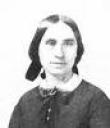 Marie Zakrzewska (6 September 1829 – 12 May 1902) was a German born physician of Polish descent who made her name as a pioneering female doctor in the United States.
Marie Zakrzewska (6 September 1829 – 12 May 1902) was a German born physician of Polish descent who made her name as a pioneering female doctor in the United States.
Zakrzewska confessed to Elizabeth Blackwell her dislike of drugs, admitting that her ‘whole success in practice’ was based on viewing medicines as ‘secondary’ often using drugs as placebos.
‘I have the reputation…. as giving hardly any medicine but teaching people how to keep well without it… I can assure you it is far harder, requiring more strength, and more endurance and patience to practice hygiene than what is called medicine’.
Marie Zakrzewska was born in Berlin in 1829, to Ludwig Martin Zakrzewski and Caroline Fredericke Wilhelmina Urban. Her father was a civil servant from a noble Polish family, who had lost their wealth and property to the Russians in 1793. Her grandmother was a veterinary surgeon, and her mother worked as a midwife.
From age 13, Marie Zakrzewska accompanied her mother, a midwife, on her rounds, and at age 20 she enrolled in midwifery studies at the Royal Charity Hospital in Berlin, where her mother had trained.
Opportunities for women were scarce, but thanks to the support of Joseph Hermann Schmidt, professor of obstetrics and the director of the school of midwifery, Marie Zakrzewska was promoted to head midwife in 1852, despite the disapproval of other faculty and not long after she finished her own training.
After six months as head of midwifery, she moved to the United States to study medicine. In 1862, Marie Zakrzewska, M.D., opened doors to women physicians who were excluded from clinical training opportunities at male-run hospitals, by establishing the first hospital in Boston”and the second hospital in America” run by women (‘I think the New England Hospital is on the right track), the New England Hospital for Women and Children… she enrolled at a traditionally all-male medical school, Cleveland’s Western Reserve College (homeopathic), in 1854.
She was one of only six women admitted to the school during the 1850s, and she graduated with a doctor of medicine degree in 1856. Like others in this first generation of women physicians, she struggled to find work. continue reading:
Zakrzewska then worked as professor of obstetrics at the homeopathic New England Female Medical College in Boston (1859-62). Zakrzewska also became involved in the struggle against slavery and campaigned for woman suffrage.
Zakrzewska became active in the American Woman Suffrage Association, and she was close to homeopaths Martha Ripley and Mercy B Jackson.
Homeopathic supporter Caroline Healey Dall edited Zakrzewska’s letter to Samuel Sewall, a Boston Lawyer and feminist supporter of women’s institutions. He served as a director of the New England Female Medical College, where Lucy, his daughter by his first wife, studied under Zakrzewska.
In this letter, Zakrzewska describes being introduced to homeopathy by her aunt’s homeopath Arthur Ernst Lutze (1813-1870):
Shortly after the death of my aunt, the attending physician introduced me to a disciple of Hahnemann by the name of Arthur Ernst Lutze; who was, I think, a doctor of philosophy,–certainly not of medicine. Besides being an infinitesimal homeopathist this man was a devotee to mesmerism.
He became very friendly towards me, and supplied me with books; telling me that I would not only make a good homeopathic physician, but also an excellent medium for mesmerism, magnetism, &c. At all events, I was glad to get the books, which I read industriously; while he constantly supplied me with new ones, so that I had quite a library when he left the place, which he did before my return.
He, too, lived in Berlin, and inquired my residence; promising to visit me there, and to teach me the art he practised…. Arthur Ernst Lutze kept his word: he visited me at my home, gave me more books, and directed my course of reading.
But my father, who had become reconciled to my inclination to assist my mother, was opposed to homoeopathy, and especially opposed to Arthur Ernst Lutze. He even threatened to turn him out of the house, if I permitted him to visit me again; and burned all my books, except one that I snatched from the flames. From this time, I was resolved to learn all that I could about the human system.
Zakrzewska never doubted the therapeutic efficacy of homeopathy, but in the climate of medical politics, she decided to opt for getting women doctors trained first and foremost.
A close friend and supporter of Marie Zakrzewska was Julia Ward Howe who spoke at the inaugural address for the homeopathic New England Female Medical College that Zakrzewska had founded. Ward Howe was herself one of the founders of the New England Women’s Club.
Zakrzewska was affectionately known as Dr. Zak to her colleagues. Interestingly, Elizabeth Stuart Phelps wrote Dr. Zay, which tells the story of a homeopath who attended the New York Medical College and Hospital for Women, clearly an homage to Zakrzewska.
Marie Zakrzewska died a heart attack on 12 May 1902, in Jamaica Plain, Massachusetts. Her home is on the Boston Women’s Heritage Trail.


Leave A Comment